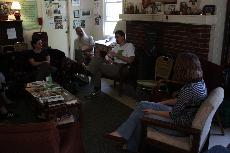Early in the afternoon of Sept. 11, students from Guilford and UNC-Greensboro gathered in the Hut to listen to the words and wisdom of Jonathan Wilson-Hartgrove, author of the recently published book “New Monasticism” and founder of the Rutba Community in Durham. As part of campus ministry’s brown-bag discussion series, Wilson-Hartgrove’s appearance came for some students as a long-awaited opportunity to engage with a different variety of Christian thinking and activism.
“For a lot of students, this book serves as a first-time introduction to a type of Christianity other than its right-wing support group,” said Director of Friends Center and Campus Ministry coordinator Max Carter in the brief minutes before Wilson-Hartgrove’s appearance.
Carter, who plays a central role in organizing the brown bag talks, uses Wilson-Hartgrove’s book in his own classes for its insights about living in intentional communities, planned residential areas working together with a common vision.
Enter Wilson-Hartgrove, a tall, goateed man with close-cropped, sandy brown hair. Arriving with a small retinue of students who caught him on his way through the cafeteria, he smiled broadly and sat down, nostrils flaring as he took in the Hut’s pleasant bookish must.
“Somebody’s been baking!” he exclaimed, looking around at the dozen people munching expectantly on the fresh muffins provided by Max Carter’s wife, Jane. He took one and begins almost immediately to speak about his life.
Wilson-Hartgrove has come a long way from where he began, in the conservative Southern Baptist environment of Stokes County, N.C., to being the widely acclaimed author and founder of an inspiring new intentional community he is today.
Not originally interested in leading a life of simplicity and social outreach, Wilson-Hartgrove says that from about age 16 he was involved in politics, working as an aide under the late Jesse Helms, the infamous North Carolina senator whose efforts to oppose everything from affirmative action to the government support for modern art earned him the title “Senator No.”
Wilson-Hartgrove did not last long in this position, not so much for political reasons-at least at the time- as for a sudden epiphany triggered by an encounter with a homeless man.
“It was an intense schedule, I was on board, I was going to make it,” he said of his path to the White House. “And then one day on my way to Union Station a homeless man asked me for change. I tried to ignore him, but then, the voice of Jesus spoke to me in the King James English I was familiar with. I rushed back to my apartment to grab some of my Billy Graham tracts, sold them, and gave the man the money.”
After leaving Washington, Wilson-Hartgrove embarked on another series of ventures, ultimately leading to his involvement in a Christian peace-building organization in Iraq during the early stages of the war. There he encountered a powerful sense of hospitality that he hoped to reproduce when he founded the Rutba Community in Durham in 2003.
Containing 12 people in two houses, the Rutba Community distinguishes itself from other strains of mainstream Christianity by emphasizing that its members are followers of Jesus first, and Christians second. However, it is not Wilson-Hartgrove’s intention to alienate the Rutba Community’s members from the Church.
Rather, he sees New Monasticism as a more direct alternative to understanding the principle teachings of Jesus. Thus, hospitality, simplicity, and charity are among the core values emphasized by the movement.
By participating with local churches in Durham, the Rutba Community also works to improve the lives of urban youths whom Wilson-Hartgrove sees as “largely excluded from the formal economy, ultimately driven to either drug trade or the military.”
“It’s not enough to get somebody a good job so they can move to the suburbs,” he said. “Getting out isn’t really the goal. The goal is to really love one another and to create a new society within the shell of the old.”
Thus, Wilson-Hartgrove’s movement is perhaps best understood as a way to mediate the dissonances that arise between people and the larger religious and governmental institutions that impact their lives. By embracing the non-hierarchical, self-sustaining components of monastic life, the Rutba Community serves as a beacon of guidance for both its members and neighbors.

